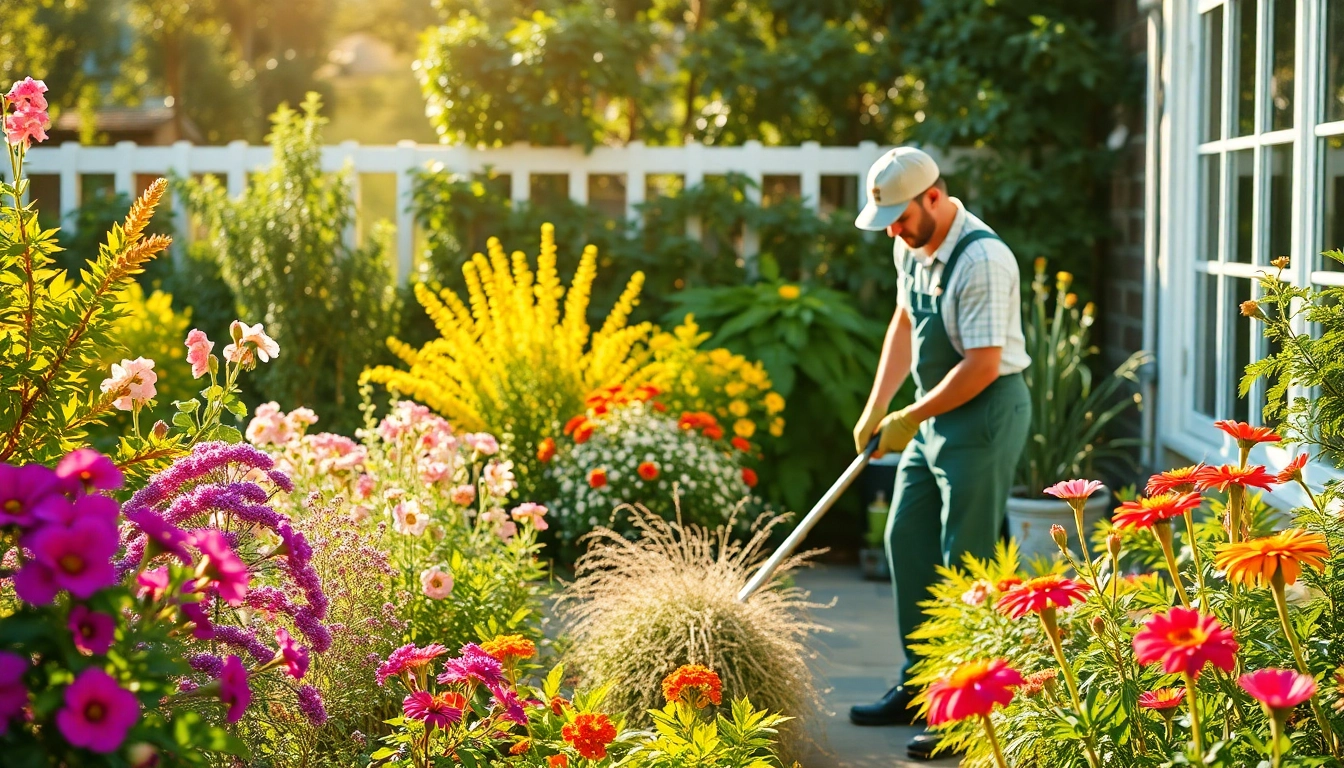
Understanding Garden Maintenance Services
What is a Garden Maintenance Service?
A garden maintenance service is a specialized service aimed at the upkeep and enhancement of gardens, landscapes, and outdoor spaces. These services can range from general upkeep tasks such as mowing lawns and pulling weeds to more specialized tasks like pest management, tree trimming, and seasonal planting. The primary goal of garden maintenance is to keep your outdoor space healthy, aesthetically pleasing, and functioning optimally throughout the year.
Benefits of Professional Garden Maintenance
Engaging a professional garden maintenance service offers a multitude of benefits, including but not limited to:
- Expertise: Professional gardeners possess extensive knowledge about various plant species, soil types, and optimal planting strategies. They can identify and resolve potential issues before they escalate.
- Time-saving: Maintaining a garden can be time-consuming. Hiring professionals allows homeowners to save valuable time and focus on enjoying their garden rather than laboring over it.
- Custom Solutions: Professionals can develop tailored maintenance plans based on specific garden needs, local climate conditions, and homeowner preferences.
- Consistent Quality: With regular maintenance, the quality and health of the garden is ensured, which can lead to increased property value and a more inviting home environment.
Common Services Included in Maintenance Packages
Most garden maintenance packages typically include a range of services designed to keep the garden healthy and thriving. Common elements often encompass:
- Lawn Care: Regular mowing, aeration, fertilization, and weed control.
- Plant Care: Pruning, deadheading, and seasonal planting of flowers and shrubs.
- Pest Control: Organic and chemical treatments to manage pests and diseases effectively.
- Garden Clean-up: Removal of debris, leaves, and spent flowers to maintain a tidy appearance.
- Mulching: Application of mulch to help retain moisture, reduce weeds, and improve the garden’s overall appearance.
Choosing the Right Garden Maintenance Service
Evaluating Service Providers
Choosing the right garden maintenance service can be a daunting task. Here are some steps to evaluate potential providers:
- Research: Look for local services online, read reviews, and check ratings on platforms such as Google and Yelp.
- Experience: Consider how long the company has been in business and the experience of the staff. Experienced providers are more likely to handle various gardening challenges effectively.
- Certifications: Check for any professional certifications or affiliations with gardening organizations which indicate a commitment to professional standards.
- Portfolio: Ask for before-and-after photos of previous work to gauge the quality of their service.
Understanding Pricing and Packages
Costs for garden maintenance services vary significantly based on the size of the garden, the complexity of the tasks, and geographic location. Understanding pricing structures involves:
- Hourly Rates vs. Packages: Some services charge by the hour, while others offer packages that include a set list of services for a flat fee.
- Estimates: Many companies provide free estimates. It’s advisable to get multiple quotes to compare prices and service offerings.
- Hidden Fees: Ensure you ask about any possible additional charges that may not be included in the initial quote.
Questions to Ask Before Hiring
Before hiring a garden maintenance service, it’s essential to ask the right questions to ensure they meet your needs:
- What services are included in your maintenance packages?
- Do you provide a written contract or agreement?
- What happens if I am not satisfied with the services provided?
- How do you handle plant disease or pest problems?
- Can you provide references from previous clients?
DIY vs. Professional Maintenance: Making the Choice
When to Consider a Garden Maintenance Service
While many gardening tasks can be managed at home, determining the right time to hire a professional service can depend on several factors:
- Complexity of Tasks: For large or complex gardens that require specialized knowledge (e.g., dealing with pests, landscape design), a professional may be preferable.
- Time Constraints: If your schedule does not allow for regular maintenance, outsourcing may be the best choice.
- Knowledge Gaps: If you are uncertain about what your garden needs to thrive, a professional can provide valuable insights.
Simple DIY Maintenance Tips
If you choose to maintain your garden yourself, consider the following tips for effective upkeep:
- Regular Weeding: Make weeding a routine task to prevent weeds from taking over your garden.
- Watering Wisely: Water in the early morning or late evening to minimize evaporation and ensure plants get adequate moisture.
- Soil Health: Test soil annually and add amendments as necessary to maintain soil fertility.
- Plant Selection: Choose native plants that require less maintenance and are better suited to your local climate.
Cost-Benefit Analysis of Professional Help
When considering the financial aspects of garden maintenance, a cost-benefit analysis can help determine if hiring professionals is worth it:
- Initial Costs: Hiring professionals may seem costly upfront, but the long-term benefits can outweigh the expense if it leads to a healthier garden.
- Home Value: A professionally maintained garden can increase property value and attract potential buyers.
- Time Saved: The time saved can be used for other activities, enhancing quality of life.
Best Practices for Garden Upkeep
Seasonal Maintenance Tasks
Maintaining a vibrant garden involves performing specific tasks throughout the seasons:
- Spring: Start with thorough cleaning, pruning, fertilizing, and planting seasonal flowers.
- Summer: Focus on weed control, regular watering, and monitoring for pests.
- Fall: Clear fallen leaves, plant autumn bulbs, and prepare plants for winter dormancy.
- Winter: Protect sensitive plants with mulch, plan for next year’s garden, and service tools.
Tools Every Gardener Should Own
Having the right tools can make garden maintenance much more manageable. Essential tools include:
- Pruning Shears: Essential for trimming plants and promoting healthy growth.
- Spade and Shovel: For digging, planting, and transferring soil.
- Rake: Useful for keeping the garden tidy, especially in fall.
- Garden Hose or Watering Can: Necessary for proper watering.
- Weed Puller: An effective tool for removing invasive weeds from the garden.
Eco-Friendly Maintenance Strategies
Adopting eco-friendly practices can enhance garden health while protecting the environment. Consider implementing:
- Composting: Convert kitchen scraps and yard waste into valuable compost for enriching garden soil.
- Mulching: Use organic materials to improve soil health and retain moisture.
- Natural Pest Control: Utilize beneficial insects and organic pesticides to manage pests sustainably.
- Water Conservation: Implement rain gardens or rain barrels to capture runoff and promote biodiversity.
Measuring the Success of Your Garden Maintenance Service
Setting and Tracking Goals
To determine the effectiveness of your garden maintenance service, it’s vital to set clear goals and track progress. Goals might include:
- Enhancing overall plant health and vitality.
- Reducing pest populations significantly over a season.
- Achieving a specific aesthetic condition, like a lush flower display or a thriving vegetable patch.
Performance Indicators for Garden Health
Some key performance indicators (KPIs) can help measure garden health:
- Plant Growth: Monitor growth rates of flowers, shrubs, and trees.
- Pest and Disease Control: Track incidences of pest invasions or plant diseases.
- Soil Quality: Regularly test soil pH and nutrient levels.
Adjusting Your Maintenance Plan Based on Results
Regular assessments of your garden maintenance plan can lead to adjustments that improve outcomes:
- Modify watering schedules based on seasonal conditions and weather reports.
- Shift pest management strategies as new challenges arise or as certain techniques prove effective.
- Change planting strategies based on observed growth patterns and success rates of certain species.







